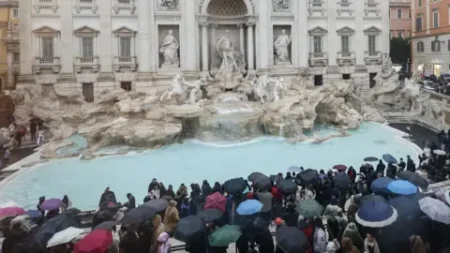The recent decision of CBS to cancel “The Late Show” has sparked a whirlwind of questions and debates across various quarters, particularly with regard to its reasoning and implications. At first glance, it seems illogical for a network to cancel a program that boasts both recognition and a leading performance in its time slot. However, navigating through the internal dynamics at CBS reveals a more complex landscape that highlights financial pressures and strategic moves that have culminated in this surprising action.
During the mid-summer period when Stephen Colbert was on his customary vacation, CBS executives conducted a thorough analysis of “The Late Show’s” performance. Despite its strong viewership, it became increasingly evident that the show was not turning a profit. The decision to discontinue the show wasn’t made lightly, as it was described by many as an “agonizing decision” by the executives. However, they ultimately opted for financial viability over popularity, emphasizing that the move was primarily driven by economic considerations rather than political motivations.
While CBS executives asserted this focus on financial factors, skepticism arose from industry observers due to Colbert’s vocal critiques of former President Donald Trump. The landscape of late-night television has indeed been changing, with significant audience fragmentation and increased digital competition leading to a downturn in advertising revenues. A CBS insider articulated that the situation could be described as “cratering,” signifying the dire state the network finds itself in. Despite Colbert’s notable lead over competitors like Jimmy Fallon and Jimmy Kimmel, the broader audience for late-night programs has been dwindling, leading to fewer ad dollars.
To give an accurate picture, data from Guideline reveals a stark contrast in ad revenue. Whereas networks collectively earned $439 million in ad revenues in 2018, projections for 2024 indicate a crashing 50% reduction to approximately $220 million. As indicative of changes in viewership behavior, advertisers are gravitating away from traditional late-night programs, a trend that has been observable over the last few years.
Even though CBS could have considered altering its cost structures, an examination of past practices reveals a trend towards financial trimming. The network’s decision to terminate “The Late Late Show with James Corden” and replace it with a more budget-friendly production dubbed “After Midnight” exemplified their willingness to realign their programming strategy towards cost efficiency. This raises questions about why a similar approach wasn’t employed with “The Late Show.”
Colbert, who held dual roles as an executive producer for both “After Midnight” and “The Late Show” was likely aware of the financial hardships. However, the expedited cancellation confirmation implies that he may not have had a genuine opportunity to provide strategic cost-saving alternatives. The culmination of the show’s impending retirement set for May 2026 has been noted by insiders as an unfortunate “casualty of the merger.”
This merger refers specifically to CBS’s conjoining with Skydance, a media firm overseen by David Ellison, the son of billionaire Larry Ellison from Oracle. The latter is known for his connections with Trump, a detail that has heightened concerns regarding political influences on media operations. The upcoming merger — necessitating Trump’s administration approval — raises critical questions not just about CBS’s operational integrity but also about the prospective economic driving forces motivating managerial decisions.
Complicating matters further was CBS’s recent settlement involving Trump concerning a lawsuit stemming from the CBS News program “60 Minutes.” The settlement’s details, which include a contribution towards Trump’s future presidential library, have drawn further scrutiny and are invoked by Democrats, including Elizabeth Warren, who demanded transparency on whether political motives played a role in this significant programming decision.
As the dust settles on this contentious issue, it becomes clear that the cancellation of “The Late Show” will likely reverberate in increasing discussions on the intersection of media, politics, and financial imperatives. CBS executives, while navigating the intricacies of audience retention and profitability, are also prepared to face the inevitable fallout from a decision that has raised eyebrows and ignited controversy far beyond the entertainment industry.











